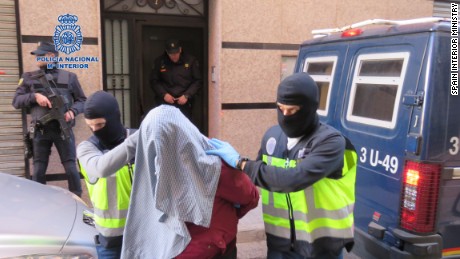-
Tips for becoming a good boxer - November 6, 2020
-
7 expert tips for making your hens night a memorable one - November 6, 2020
-
5 reasons to host your Christmas party on a cruise boat - November 6, 2020
-
What to do when you’re charged with a crime - November 6, 2020
-
Should you get one or multiple dogs? Here’s all you need to know - November 3, 2020
-
A Guide: How to Build Your Very Own Magic Mirror - February 14, 2019
-
Our Top Inspirational Baseball Stars - November 24, 2018
-
Five Tech Tools That Will Help You Turn Your Blog into a Business - November 24, 2018
-
How to Indulge on Vacation without Expanding Your Waist - November 9, 2018
-
5 Strategies for Businesses to Appeal to Today’s Increasingly Mobile-Crazed Customers - November 9, 2018
Spanish police arrest 6 on suspicion of jihadi links to IS
The arrests were carried out in the cities of Alicante and Valencia on the east coast of Spain and in the Spanish North African enclave of Ceuta.
Advertisement
Among those arrested include five Spanish nationals of Syrian, Jordanian, and Moroccan origin, and two foreigners of Syrian and Moroccan origin.
A Syrian and a Moroccan were also taken into custody, it said.
“There was a centralized leader that directed all the activity through a business complex which permitted him, without raising any suspicions, to send material in closed containers from Spanish ports to terrorist groups in Syria and Iraq”. However, investigations revealed that the suspects were in reality sending military and technological equipment, money, weapons, and materials to build explosives to Islamist organisations, local media reported.
The organisation is suspected to have also embarked on a social media campaign to recruit individuals across Europe.
The seven detained were part of a cell which was providing logistical support to ISIS and the al Nusra Front in Syria, according to the statement.
Four men were arrested in Ceuta shortly after the attack, with Spain’s Interior Minister at the time describing them as having a “very similar profile” to the French extremists who killed 11 people and injured another 12 during the Charlie Hebdo killings.
Advertisement
The investigation into the cell first began in 2014, the interior ministry said, adding that the “perfectly organized group” had operated in other European countries before establishing itself permanently in Spain.





























